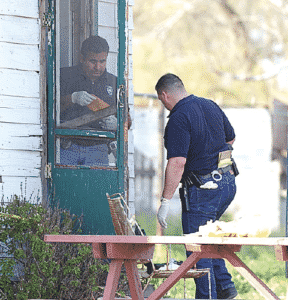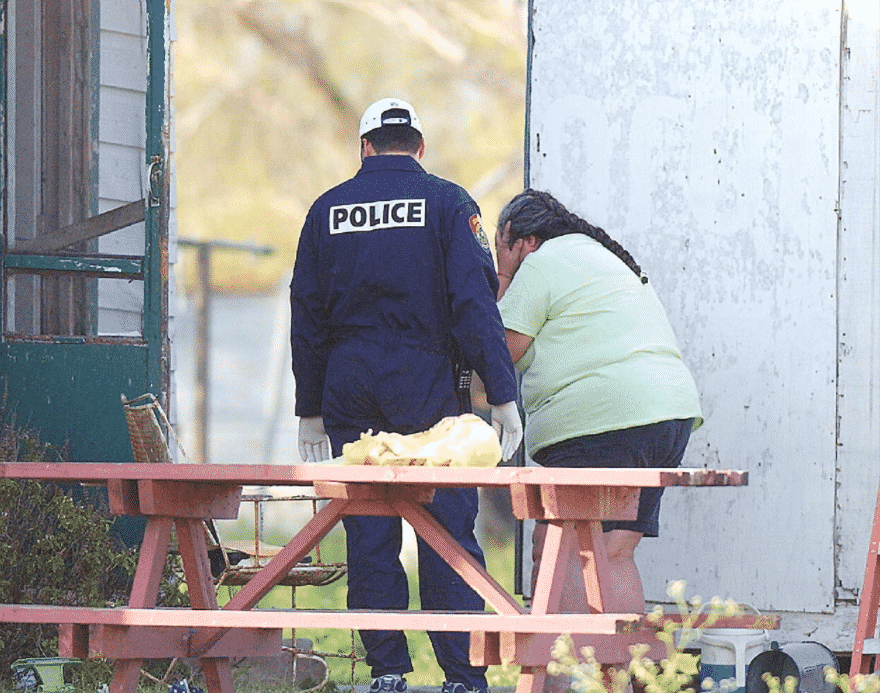
The Texas Court of Criminal Appeals last week shot down a request by a 37-year-old Donna man who is on Death Row to have DNA evidence in the Edinburg Massacre case tested.
The high court made the ruling in Juan Raul Navarro Ramirez’s appeal, in which he argued that had a black ski mask with the word “POLICE” and a black beanie with an “8 Ball” logo been tested during his trial, the biological evidence would have been exculpatory and he would not have been convicted.
Ramirez is one of multiple individuals, including two others who were sentenced to death, convicted in the Jan. 5, 2003, Tri-City Bombers-organized “pseudocop” robbery of a home where six rival gang members were bound with extension cords and shot to death.
Those victims are Jimmy Almendarez, Juan Delgado III, Jerry Eugene Hidalgo, Juan Delgado Jr., Ruben Castillo and Ray Hidalgo.
The high court disagreed with Ramirez’s assertion that DNA testing would have exonerated him at trial.
“Appellant confessed to participating in this home invasion with multiple assailants, and almost all of the acts mentioned in Appellant’s confession were corroborated by the elderly aunt of two of the victims who was also tied up and injured. It is uncontroverted that Appellant, his codefendants, and all of the victims were members of two violent street gangs that dealt in large quantities of drugs and had ‘green lights’ to kill each other, and Appellant was convicted and sentenced to death under the law of parties,” the ruling states.
The robbery was precipitated after an individual attended a party at the house where the killings took place and saw a room full of marijuana bundles.
That information made its way to the Tri-City Bombers who organized the robbery, which turned into a massacre of six men.

Sunday on Monte Cristo Road on Jan. 5, 2003 in Edinburg. (Joel Martinez | [email protected])
According to the Texas Court of Criminal Appeals, there is simply no way the DNA testing would have helped Ramirez’s case.
“As a result, regardless of what DNA, if any, was found in the hats, it could not have provided any true exculpatory evidence. If Appellant’s DNA was contained in either hat, it would have inculpated him. But if another person’s DNA was discovered, those results would have been meaningless given the aunt’s testimony regarding the hats and the number of assailants and dead victims who could have worn the hats,” the ruling stated.
Ramirez also has a federal writ of habeas corpus where he makes 21 claims challenging his conviction and sentence, which he says violated his constitutional rights.
Those proceedings have been on hold pending the Texas Court of Criminal Appeals proceedings, which focus solely on Chapter 64 of the Texas Code of Criminal Procedure.
According to this court’s ruling, to obtain post-conviction DNA testing Ramirez must establish by a preponderance of evidence that he would not have been convicted if DNA testing produced exculpatory results and that the request for the proposed DNA testing isn’t made to unreasonably delay the execution of his sentence, which the court ruled Ramirez did not satisfy.
However, a federal judge in Brownsville recently ruled that Chapter 64 is unconstitutional because it is irreconcilable with another portion of the Texas Code of Criminal Procedure, Article 11.071, which allows a convict to file a second habeas petition with a clear and convincing showing of innocence of the death penalty.
“These two statutory provisions are irreconcilable. Texas grants the substantive right to file a second habeas petition with a clear and convincing showing of innocence of the death penalty in Article 11.071, and then Chapter 64 denies the petitioner access to DNA evidence by which a person can avail himself of that right,” Senior U.S. District Judge Hilda Tagle wrote in a March 23 ruling.
Tagle’s ruling is in the case of 44-year-old Ruben Gutierrez, who was convicted of entering 85-year-old Escolastica Harrison’s home on Sept. 5, 1998, and participating in her murder. He was sentenced to death.

the crime scene after six people were killed early Sunday
morning on Monte Cristo Road on Jan. 5, 2003. (Joel Martinez | [email protected])
“Gutierrez and two co-defendants entered the home office of an 85-year-old Hispanic female with the intent to rob her of the money she kept in a safe. The victim was struck repeatedly and stabbed multiple times in the head, causing her death. The subject and co-defendants fled the residence with a minimum of $56,000,” according to the Texas Department of Criminal Justice.
Like Ramirez, Gutierrez claims that DNA evidence — a fingernail scraping — would confirm the true identity of who committed the crime.
For years, Gutierrez has been asking for that fingernail scraping to be tested, but he has been unsuccessful — until Tagle’s ruling, according to his attorneys.
“A stark conflict exists between Chapter 64 and Article 11.071. Texas courts have applied these laws in a way that denies a habeas petitioner sentenced to death his rights granted by the State of Texas and protected under the Due Process Clause of the Constitution,” Tagle wrote. “Due process does not countenance procedural sleight of hand whereby a state extends a right with one hand and then takes it away with another. To do so renders meaningless an express right and transgresses a principle of fundamental fairness.”
While Ramirez and Gutierrez’s appeals are in different stages, there are similarities in their cases.
Both men were convicted and sentenced to death under the law of parties and both men have sought to access Chapter 64 for post-conviction DNA testing they argue will show they are innocent of the crime.
However, like the Texas Court of Criminal Appeals ruling that said the DNA testing would be meaningless in Ramirez’s case because of other evidence implicating him and the law of parties, Cameron County District Attorney Luis V. Saenz recently said the same in Gutierrez’s case.
“Separate and apart from the dilatory tactics of Gutierrez, his case is not one that in which a DNA test is required or necessary. We know he did the crime. Ruben Gutierrez murdered Mrs. Harrison. He confessed; a co-defendant identified him as the organizer; he led the police to the money he stole from Mrs. Harrison; and, in the middle of his trial, he threatened to murder then ADA Rebecca RuBane just like he murdered Mrs. Harrison,” Saenz told The Brownsville Herald.
Tagle’s ruling has been appealed to the federal Fifth Circuit Court of Appeals.
As for Ramirez, the next step in case may be the re-opening of his federal writ of habeas corpus in front of U.S. Magistrate Judge Peter E. Ormsby and U.S. District Judge Micaela Alvarez in McAllen.





